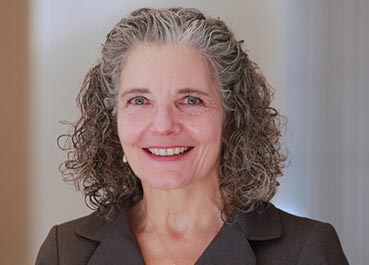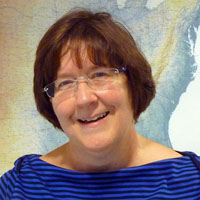Supporting STEM Faculty Development during the Pandemic
Pamela Eddy, professor of Higher Education; Heather Macdonald, professor in the Department of Geology at William & Mary; and Eric Baer, instructor in the Geology program at Highline College, published a peer-reviewed article in New Directions for Community Colleges in August 2021. The article, titled “Professional development during a crisis and beyond: Lessons learned during COVID,” reported out about a virtual professional development program for STEM faculty conducted in 2020. A few months after the Professional Development (PD) program launched, the faculty participants had to adjust their teaching practices due to COVID.
 The global pandemic triggered campus closure and brought rapid changes in education across the country. Faculty had to quickly transition to remote teaching and faced unprecedented challenges in their lived experiences. Given this context, the study captured a year-long PD program and centered on two research questions: Why did the faculty stick with this optional, additional work during a time of professional and personal challenge? How could the virtual professional development model used offer insights to others? The authors described the virtual PD project that is part of a National Science Foundation (NSF) project, SAGE 2YC: Faculty as Change Agents, focused on geoscience and other STEM community college faculty. The virtual PD format provided a series of asynchronous and synchronous activities, workshops, and other virtual activities to engage faculty in learning about evidence-based strategies. The authors focused on a cohort of faculty who participated in the virtual PD program during a pandemic. The faculty comprised 48 community college faculty including full-time and adjunct STEM faculty from 17 community colleges across the country who represented a range of diverse colleges – small and large, urban and rural.
The global pandemic triggered campus closure and brought rapid changes in education across the country. Faculty had to quickly transition to remote teaching and faced unprecedented challenges in their lived experiences. Given this context, the study captured a year-long PD program and centered on two research questions: Why did the faculty stick with this optional, additional work during a time of professional and personal challenge? How could the virtual professional development model used offer insights to others? The authors described the virtual PD project that is part of a National Science Foundation (NSF) project, SAGE 2YC: Faculty as Change Agents, focused on geoscience and other STEM community college faculty. The virtual PD format provided a series of asynchronous and synchronous activities, workshops, and other virtual activities to engage faculty in learning about evidence-based strategies. The authors focused on a cohort of faculty who participated in the virtual PD program during a pandemic. The faculty comprised 48 community college faculty including full-time and adjunct STEM faculty from 17 community colleges across the country who represented a range of diverse colleges – small and large, urban and rural.
The study found that the program’s structure, focus, and ability to foster community helped sustain faculty members. Participants shared lessons learned through virtual workshops they led for others on their campuses. Furthermore, the study provided practical implications for campus leaders and highlighted central elements contributing to the success of the virtual PD during a crisis: 1) building program structure that allows for repeated opportunities for participants to talk with each other and learn together about things that matter to them; 2) modeling good teaching practice; 3) providing hands-on application of learning; 4) building community that fosters a lasting network.
 Because many community college campuses lack standalone teaching and learning centers, it is important to consider how to establish support systems for faculty without this structure in place. The study recommended that Chief Academic Officers and other campus leaders could provide this support without a center by taking the following actions: 1) Partnering with other regional campuses or with a central system office to leverage resources; 2) Providing virtual professional development access to both full-time and adjunct faculty members to enhance teaching practices, and encouraging participation through ties to annual review, promotion, or access to additional resources; 3) Tapping faculty members on campus to lead workshops on evidence-based teaching practices that can build buy-in and help develop leadership skills in the faculty presenters; 4) Building faculty professional learning communities on campus to foster networks that allow for learning about and sharing information on teaching and learning; and 5) Encouraging and facilitating faculty analysis of data on student outcomes paired with support for addressing equity gaps or other opportunities for improvement.
Because many community college campuses lack standalone teaching and learning centers, it is important to consider how to establish support systems for faculty without this structure in place. The study recommended that Chief Academic Officers and other campus leaders could provide this support without a center by taking the following actions: 1) Partnering with other regional campuses or with a central system office to leverage resources; 2) Providing virtual professional development access to both full-time and adjunct faculty members to enhance teaching practices, and encouraging participation through ties to annual review, promotion, or access to additional resources; 3) Tapping faculty members on campus to lead workshops on evidence-based teaching practices that can build buy-in and help develop leadership skills in the faculty presenters; 4) Building faculty professional learning communities on campus to foster networks that allow for learning about and sharing information on teaching and learning; and 5) Encouraging and facilitating faculty analysis of data on student outcomes paired with support for addressing equity gaps or other opportunities for improvement.
“As community college faculty play a significant role in influencing students’ learning experiences, supporting faculty teaching is central to student success.” Eddy said, “Our study emphasized the importance of virtual PD as an approach for promoting faculty to learn how to improve teaching especially during times of change and crisis. Meanwhile, the virtual PD enhanced faculty’s confidence and leadership skills. In the future, we want to continue to improve what we learned in this study and to investigate how the skills developed in this PD workshop keep serving faculty beyond the COVID-19 crisis.”